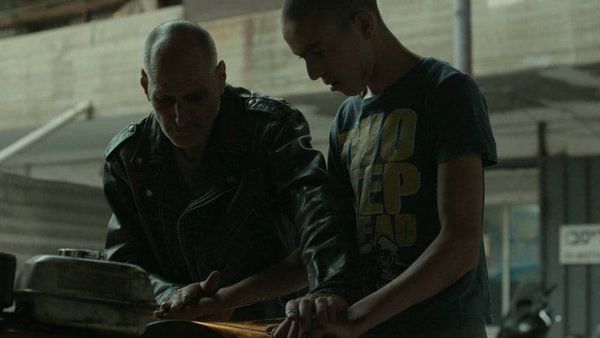 |
| Yuval Gurevich and Muhammad Da'as in Why Hast Thou Foresaken Me? Morag: 'I think that we can repeat a story over and over again but you have to look at it from a different angle' Photo: Shark De Mayo |
AW: I'm interested in the way you're using silence and noise in the film. In your short film Silence you relied on that a lot as well and here your protagonist hardly speaks at all. But there is quite a lot of industrial noise in the background.
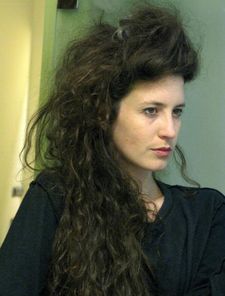 |
| Hadar Morag: 'I don't use a script when I'm working actors - they never read it. It's all physical, it's not psychological' Photo: Courtesy of Sala Web |
AW: The one time when he has an outburst, he's at home and he attacks his sister. He seems mute when he's with people who have power over him but here, where he feels he has power over his younger sister, he finds his voice.
HM:I think it's always easier to find your voice when you're around people who are weaker than you. After he's been brutalised in every way and thrown from this place to that place, the only way he can have a subjective self is by taking it out on someone else. I think that's part of how violence and a how abuse gets bigger and bigger. It's a like a snowball and you can't stop it. You get abused and then you just pass it on.
AW: You make the older character, Gurevich, virtually silent as well, why did you do that?
HM:For me, for most of my life silence was the way of communicating. I think when you live in a place that is an in between zone. It's not an Arab or Jewish zone for example, it's being in between them. It's about a place where you're divided and you have no culture, no society. I think in those places where things are so liminal, that's where language collapses - it doesn't have any meaning any more. The relationship is built over small nuances. All this noise around them, that's all that's left. And I think that's the most intimate thing, because words are nothing.
AW: In the director's statement (read it in full here) you talk about the fact that Muhammad is male and that he can do something you were never able to do. That's interesting because you are a female director making a film with all male protagonists - you've chosen a very male story with male characters. What was the reason behind that?
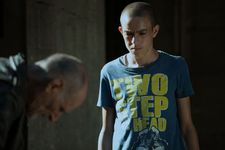 |
| 'With Muhammad, I found him in the back of a filthy restaurant in Jaffa when I was looking around for locations. I just fell in love' Photo: Shark De Mayo |
AW: So do you think having a male character in that role carries less baggage for an audience? That if it was a woman, we would be thinking different things?
HM:I think, if it was a girl, they would say that she seduced him, that she wanted it. I think that because it's a male you can go back and look at things a bit differently. I think that as women, we can try to make things different but I think we need the help of men to take responsibility also so that things can be different. It's not enough just to do it from our side. That's what I'm saying - I cannot do it by myself. I just think the perspective needs to be changed. I think that we can repeat a story over and over again but you have to look at it from a different angle.
AW: How hard was it to cast the film - it requires a lot, especially for the younger actor Muhammad Daas.
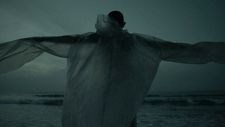 |
| Hadar: 'I think the whole rape culture became a gender type genocide in the whole world.' Photo: Shark De Mayo |
AW: It must have taken a lot of trust on his part because it's not an easy role.
HM:I was really surprised with him because he didn't read the script and didn't know what was going on, only general things. I don't use a script when I'm working actors - they never read it. It's all physical, it's not psychological. I think Gurevich had more problems because he's older and he knows what he's doing so it was hard for him to play that role of an abuser. But Muhammad's fears were more instincts. But he just wanted to give me his heart and that was amazing.
AW: Talking about the physicality of the film, there's a lot of movement in it, particularly when Muhammad is racing about on his bike. It's the one time when he seems to have some freedom really. How hard was it to shoot those scenes in traffic?
HM:It was quite difficult, some of the shots we had to do without anyone knowing and without permission because it was very difficult to get them. Muhammad was really tired and working hard. And there were a lot of harsh stories that happened in the street while we were shooting. We were shooting in very difficult places, like south Tel Aviv, which is very poor and has a lot of drugs and prostitutes. All the crew had a hard time but everyone came to me and said, it puts our world in proportion - to see all of this.
AW: You don't become explicit about Arabic/Jewish questions, it's left to the audience to interpret what they see with migrants in the kitchens and that sort of thing.
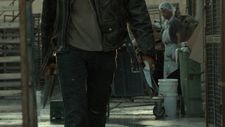 |
| 'It's a like a snowball and you can't stop it. You get abused and then you just pass it on.' Photo: Shark De Mayo |
AW: Now you've premiered in Venice are you taking hte film to other places too?
HM:Hopefully, because I'm not sure about how it's going to be received in Israel, so hopefully it will have its own life abroad.
AW: Why do you think it won't be well received in Israel?
HM:It's a little bit eccentric and avant garde for them unfortunately. Also, it's non-actors and that is difficult for them. It's too undefined because they try to put things on this side or that side and this movie is trying to capture the very opposite - what's in the middle and I think that will be a hard sell there.
Interruption is available to watch until September 13 on Sala Web - which is screening 15 films from the Venice Film Festival, priced 4 euros each or 2 euros each if you buy a pass to see five or more.





















